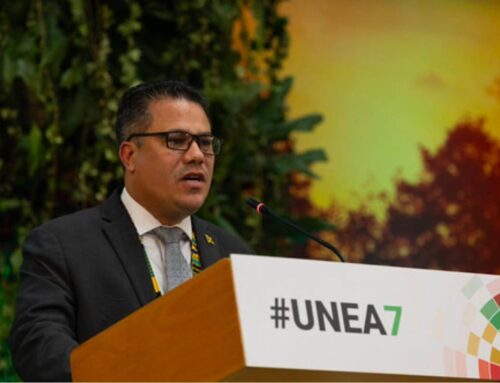Oklahoma Cannabis Advocates Submit 2026 Adult-Use Legalization Initiative
April 3, 2025
Oklahoma voters could get another shot at legalizing adult-use cannabis via a proposed constitutional amendment for the 2026 ballot that activists submitted March 31 to Secretary of State Josh Cockroft.
Sponsored by Oklahomans for Responsible Cannabis Action (ORCA), the citizen-initiated petition aims to allow adults 21 and older to possess up to 8 ounces of flower or 1 ounce of cannabis concentrate. They could also grow up to 12 plants at home and possess the harvested cannabis therefrom.
The initiative, State Question 837, would also establish a regulated and taxed adult-use market for licensed operators to cultivate, manufacture and sell cannabis products, placing a 10% excise tax on adult-use sales while also stripping the state’s current 7% excise tax on medical cannabis.
The proposal comes two years after Oklahoma voters soundly defeated an adult-use legalization initiative in a March 2023 special election, with 62% casting ballots opposing the measure, State Question 820. That failed initiative was backed by a different group—Oklahomans for Sensible Marijuana Laws.
In an FAQ sheet provided by ORCA organizers Jed Green and Adam Johnson this week, they posed the question, “Why is this time going to be different?”
“S.Q. 820 failed because it was bad language for industry, did not protect consumers and was backed by out-of-state interests who ignored local grassroots efforts,” they wrote. “Our organization members led the efforts of S.Q. 788 in 2018 and opposed S.Q. 820. Additionally, with the passage of time, the current MMJ program has evolved, and now this Act is needed to help enforcement and protect consumer safety from illegal operators.”
S.Q. 788 was the medical cannabis legalization initiative that Oklahoma voters passed with a 57% majority in the state’s June 2018 election. It was sponsored by Oklahomans for Health, a 501(c)(4) organization.
Following S.Q. 788’s passage and the rollout of the state’s medical cannabis program, many outsiders pointed to Oklahoma as the “wild west” of legalization for its unlimited license structure and low cost of entry that led to “ghost owners,” organized crime, law enforcement eradication efforts and public safety concerns.
ORCA’s attempt to land an adult-use legalization initiative on the 2026 ballot comes after the organization was unsuccessful in gathering enough signatures for a proposed adult-use legalization measure in 2022. Specifically, then-gubernatorial candidate Paul Tay challenged the initiative, with a subsequent decision in the Oklahoma Supreme Court leaving ORCA organizers three months to collect signatures on a revised petition.
Following that campaign’s shortfall, Green, who serves as ORCA’s campaign director, opposed the competing adult-use legalization measure, S.Q. 820, that ended up gathering enough signatures to land on the March 2023 ballot.
More specifically, when ORCA co-founder Kris Masterman endorsed the S.Q. 820 initiative in February 2023, Green called the “Yes on 820” campaign’s promotion of that endorsement “misleading” because Masterman was no longer affiliated with ORCA.
“When all these Yes on 820 people are gone (the day after the election), ORCA will be here, as we have been for the last four years, advocating for the best program Oklahoma can build,” Green wrote on social media at the time.
Now, two years later, Green and his fellow ORCA organizers are renewing their fight to reform the state’s cannabis laws by filing S.Q. 837 for the 2026 ballot. However, it won’t be until at least August 2025 before the group can start gathering signatures, ORCA informed supporters on Monday.
The petition, the Oklahoma Responsible Cannabis Act, not only legalizes cannabis for adults and commercial operations but also provides trigger language in the case of federal reform. In particular, should the federal government allow for the interstate transport or international export of cannabis, the petition limits the Oklahoma Legislature from assessing more than a 3% wholesale tax on cannabis exported to entities outside the state.
Also under S.Q. 837, the state’s existing medical cannabis business licensees could become vertically integrated in the adult-use market without additional fees and licenses outside their current annual renewals. All licensed medical cannabis dispensaries would be permitted to convert to adult-use sales 60 days after the initiative’s passage, while home deliveries could begin 180 days after passage.
The petition does not place a cap on how many adult-use business licenses the state’s regulatory authority can issue; however, the first application period for new licenses wouldn’t begin until three years from passage. Individuals/entities would be allowed to apply for at least one license per license type—the state Legislature could permit more. There would be a $2,500 annual license fee for all license types.
Under S.Q. 837, there would be no restrictions on the amount of cannabis licensed cultivators could grow, sell or transfer, and they’d be permitted to grow cannabis outdoors, indoors or in other structural facilities under one license. Dispensaries would be permitted to allow for on-site consumption with the approval of the property owner.
The proposal’s 10% excise tax on adult-use sales could be lowered—but not increased—by the state Legislature. Revenue generated from the tax would be distributed as follows:
- 40% to the state’s general revenue fund;
- 30% to the county where the retail sale occurred; and
- 30% to the municipality where the retail sale occurred.
For tax revenue collected in unincorporated areas, 50% would go to the state fund, and 50% would be directed to the county where the sale occurred.
ORCA’s filing comes at a time when 24 states have legalized adult-use cannabis, including bordering states Colorado, New Mexico and Missouri.
The initiative also comes as Oklahoma lawmakers are attempting to place additional hurdles on signature gathering for petitions.
The state Senate voted, 36-8, on March 18 to pass legislation that would require citizen-initiated campaigns to collect no more than 10% of their required valid signatures—currently 92,263—from a county that exceeds 400,000 residents. Only Oklahoma and Tulsa counties exceed that threshold. No more than 4% of the required signatures could be collected from each of the other counties.
The legislation would also block any out-of-state donations from supporting the circulation of an initiative petition, the Oklahoma Voice reported.
Search
RECENT PRESS RELEASES
Related Post



